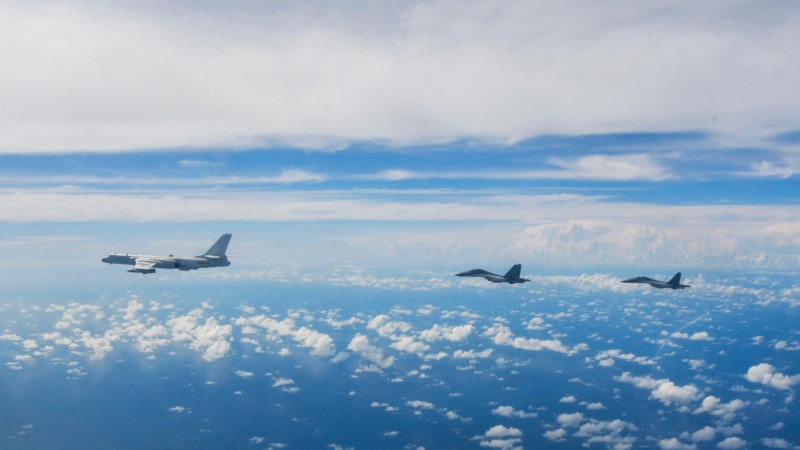Official: US Seeks Constructive Communication With China Amid Rising Tensions

The United States says diplomatic channels with China remain open even after Beijing said it was cutting cooperation with the U.S. in areas such as climate change and counternarcotics. At the Pentagon, a senior official said the tempo of Chinese military activity around Taiwan is slower than it had been immediately after U.S. House Speaker Nancy Pelosi’s visit earlier this month but is still higher than historical norms. “Deputy Secretary [Wendy] Sherman met with the [People’s Republic of China] ambassador to the United States [Qin Gang] … on August 23. We have and will continue to keep the lines of communication open with the PRC,” said State Department deputy spokesperson Vedant Patel during a Wednesday phone briefing. “Beijing has shut down some key communication channels and cooperation across several vital issues that affect the entire world,” he added. “But the United States continues to seek an open and constructive line of communication to manage our differences, especially during moments of tension.” The U.S. continues to take “calm and resolute steps” to uphold peace and stability in the region, and support for Taiwan is in line with Washington’s long-standing "One China" policy, Patel told VOA. The Chinese Embassy in Washington did not respond to VOA’s request for a readout of the meeting. Sherman’s meeting with Qin came as China continued to ramp up military maneuvers around the Taiwan Strait following successive visits to the self-ruled island by Pelosi; Senator Edward Markey, a Democrat and member of the Senate Committee on Foreign Relations; and Indiana Governor Eric Holcomb, a Republican. In Beijing, a Foreign Ministry spokesperson said Chinese officials “have made serious demarches to the U.S. side on Indiana Governor Holcomb’s visit to Taiwan,” adding that Beijing is urging “relevant [parties] in the U.S. to abide by the one-China principle” and “stop all forms of official interactions” with Taiwan. China, which claims sovereignty over Taiwan, see U.S. senior lawmakers' visits to Taiwan as irritants. Taiwan “has always been the most important and the most sensitive issue at the heart of China-U.S. relations,” said the spokesperson. U.S. officials say that Washington does not subscribe to Beijing’s One China principle, and that the U.S. remains committed to its long-standing, bipartisan One China policy, guided by the Taiwan Relations Act, the Three Joint Communiques, and the Six Assurances. U.S. officials have said Washington's One China policy is "distinct" from Beijing's One China principle. The Chinese Communist Party has never ruled Taiwan but asserts sovereignty over the self-ruled democracy. For decades, the U.S. has been clear that its decision to establish diplomatic relations with China in 1979 rested on the expectation that “the future of Taiwan will be determined by peaceful means,” as stipulated in the Taiwan Relations Act. On Wednesday, Undersecretary of Defense for Policy Colin Kahl told reporters the U.S. remains committed to a stable, free and open Indo-Pacific and will continue its freedom of navigation operations as well as Taiwan Strait transits in accordance with international law. “Our reaction is not to invite conflict or to generate unnecessary frictions but to basically make clear that Beijing's gambit isn't going to pay off. But if their goal was to coerce us and the international community to back off, it's not going to work,” he told VOA. The U.S. and China are also in talks as travel ban exemptions for 13 Taliban officials expired Friday. China and Russia want to allow them to continue to travel, while the U.S. and Western nations want to limit the number. “Discussions on whether to grant an exemption remain ongoing. And this decision requires consensus among other members of the [United Nations] Security Council,” Patel told VOA. While the U.S. sees the need to continue limited engagement with the Taliban, the purpose and scope of the travel ban waiver is “strictly limited and in no way confers legitimacy on the Taliban,” said a State Department official. This week, the U.S. and South Korea began their biggest combined military training in years. Senior American officials have said the United States considers maintaining the stability across the Taiwan Strait as vital to U.S. national interests and to the region. “The entire Indo-Pacific region and the international community have an interest in maintaining peace and stability in the Taiwan Strait,” said Daniel Kritenbrink, the State Department’s top official on East Asian and Pacific affairs, in a briefing last week. “It’s the primary route for ships from China, Japan, South Korea and Taiwan heading to Europe, the United States and all markets along the way,” he added. “Almost half of the global container fleet — 48%, and 88% of the world’s largest ships by tonnage — passed through the Taiwan Strait this year.” Carla Babb contributed to this report.
Most Read